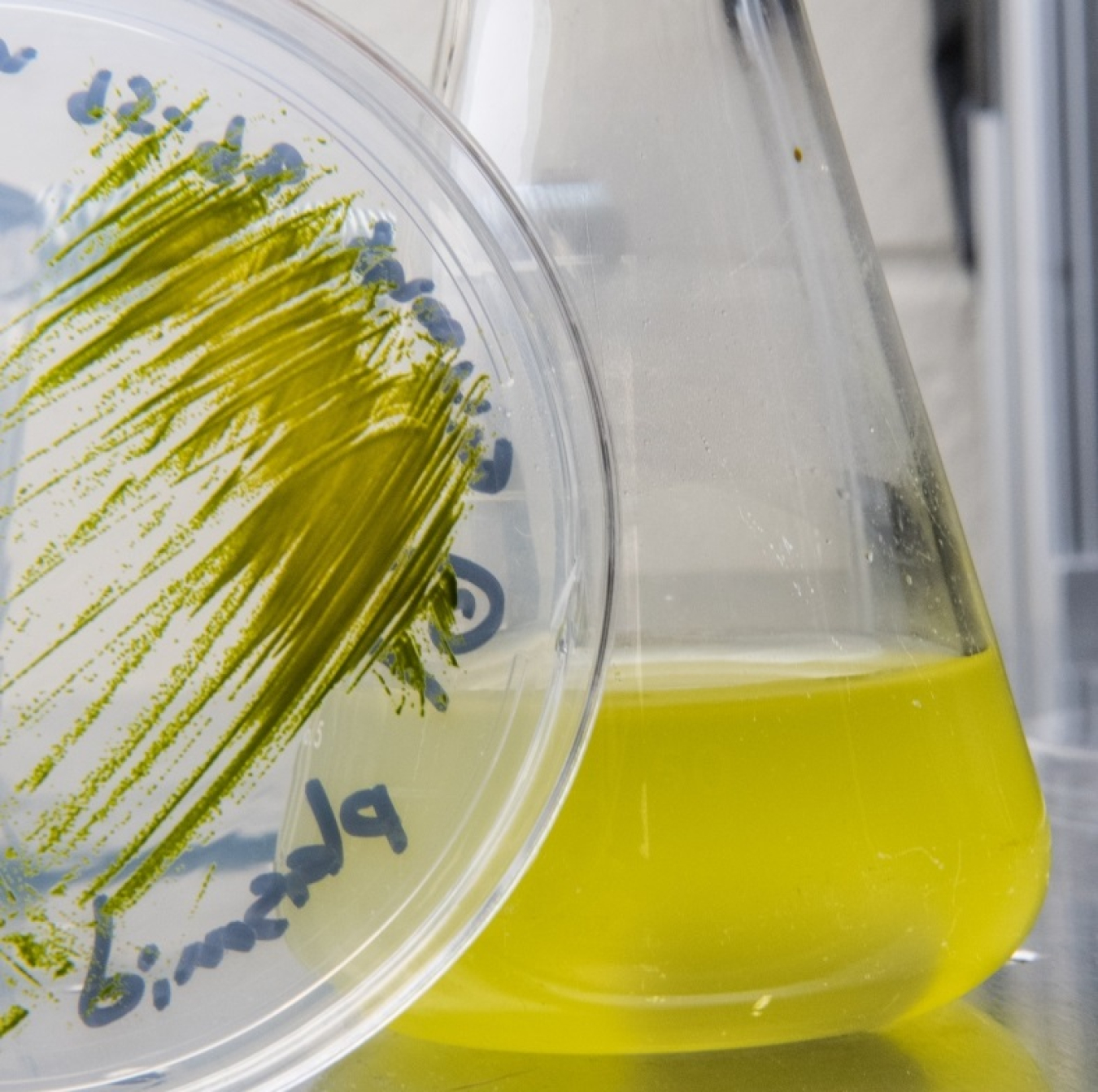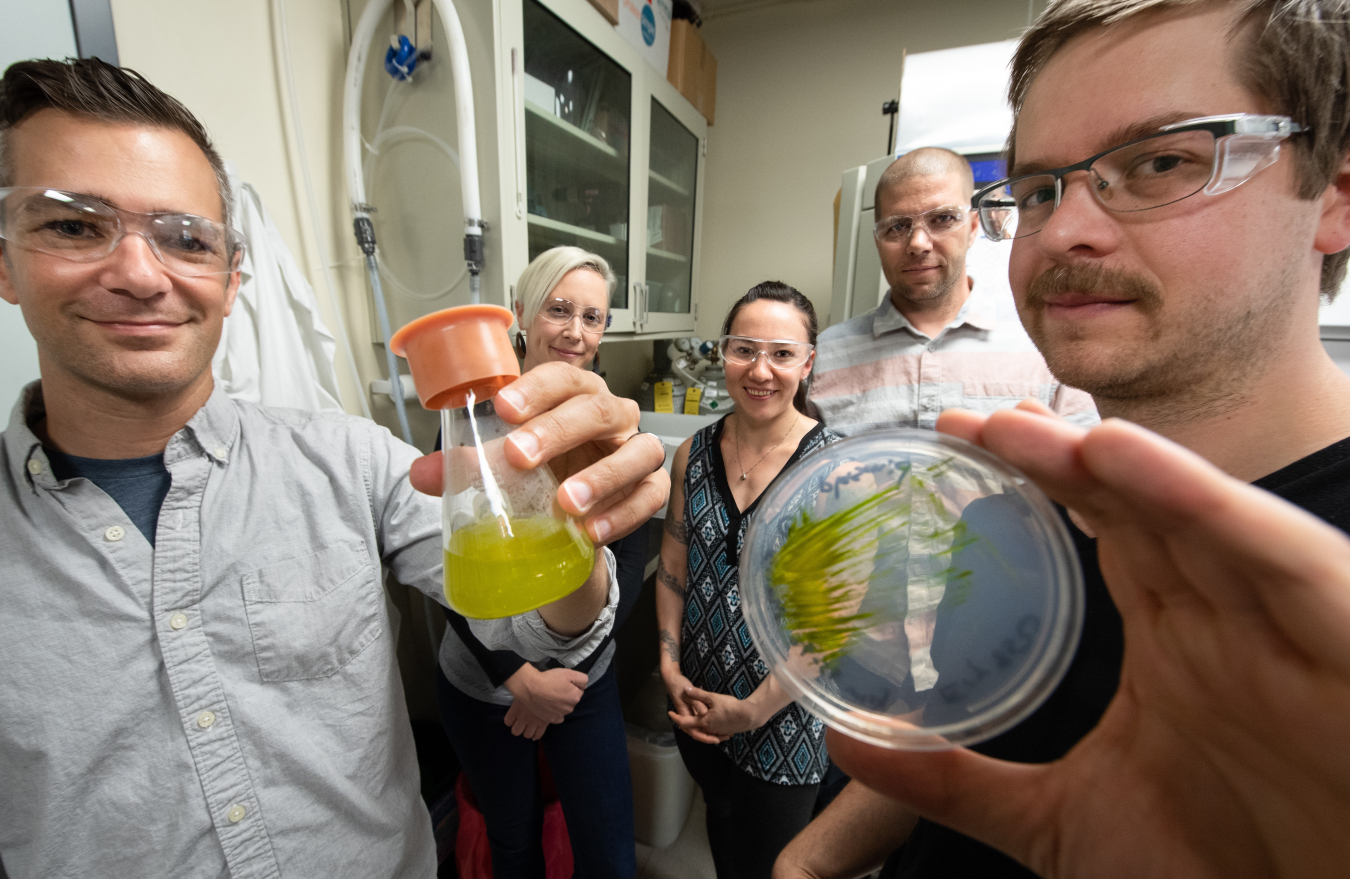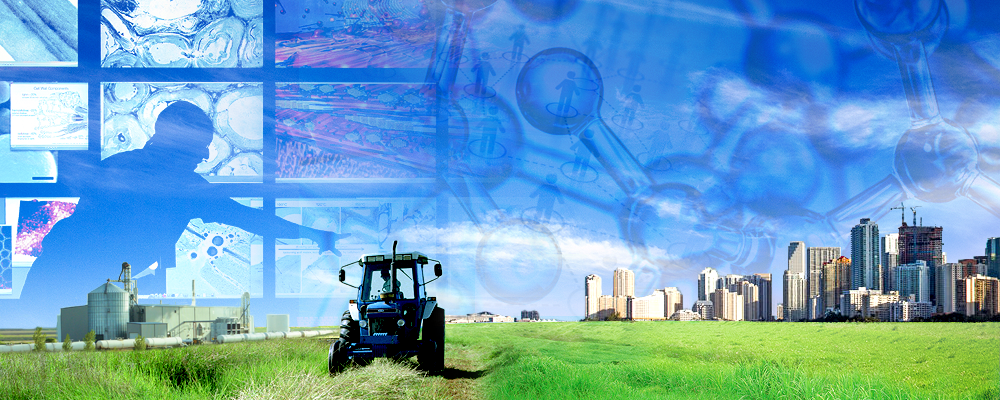Bioprose Blog: With their ability to convert carbon dioxide into renewable biomass, microalgae have potential applications in the...
December 17, 2019
Author: Zia Abdullah, Laboratory Program Manager, National Renewable Energy Laboratory
Read Zia's bio ►
Meet the other bloggers ►
Return to Bioprose blog ►
Bioprose Blog
Research Reveals Fast-Growing, Resilient Algal Strain
With their ability to convert carbon dioxide into renewable biomass, microalgae have potential applications in the production of fuel, food, and chemicals. However, many lab isolates of microalgae are not suitable for outdoor mass cultivation or farming at scales that are relevant to contributing to bioenergy, displaying a slow growth rate and low biomass productivity in environments with intense heat, sunlight, or salinity. These constraints has limited their scientific and industrial applications.
A promising new strain of microalgae isolated by scientists at the National Renewable Energy Laboratory (NREL) and Colorado School of Mines displays a rapid growth rate and high biomass productivity under harsh environmental conditions such as high light and temperature that has stopped other algae in their tracks. The discovery of this hardy and highly productive algae could lead to new advances on several fronts.

An example of the highly productive algal strain, Picochlorum renovo, developed by NREL researchers. The research was published in Nature Communications Biology. Photo by Dennis Schroeder/NREL 2019.
Seeking a Superhero Strain
Algae capture and store carbon, which can be converted into renewable biofuels and platform chemicals. The ideal strains need to grow quickly in extreme conditions, but current model algae have not been suitable for outdoor cultivation. Further, much of the applied research in microalgae is being implemented in strains that do not have viable genetic systems that allow researchers to study their biology.
NREL scientists were in search of strains that they could both deploy for mass cultivation outdoors and use in fundamental biology research. The new strain they identified—named Picochlorum renovo, with “renovo” coming from a Latin word meaning “renew”—has shown great potential in both areas.
Their research will enable scientific inquiries into this alga’s biology and may advance the development of broad applications in fuel, food, and chemical production.
An Alga That Has It All
NREL researchers spent about 18 months studying hundreds of algal strains to find ideal candidates for further research. Picochlorum renovo was tested in outdoor raceway ponds in Mesa, Arizona, demonstrating sustained productivity among the highest reported to date in seawater media, and withstanding water temperatures close to 40°C (or 104°F) with solar light intensity of over 2,500 µE. The strain’s rapid growth may be, in part, attributable to its ability to undergo cell division both day and night, coupled to a relatively compact genome.
First classified in 2004, the genus Picochlorum has become known for its fast growth and tolerance of saltwater, intense light, and heat, which are unique traits in the world of microalgae. In addition to thermotolerance, it is important for the algae to thrive in saltwater, which offers greater renewability and better economic viability relative to freshwater.

NREL researchers work together on the development of a high-productivity microalga called Picochlorum renovo. This research was published in Nature Communications Biology. Photo by Dennis Schroeder/NREL 2019.
Easy to Genetically Modify for Improved Performance
Following identification of the strain, researchers went on to develop genetic tools that can now be used to probe the mechanisms governing this strain’s unique phenotype, including its salt tolerance, thermotolerance, and high productivity, and ultimately leverage this knowledge to improve its performance. Genetic modifications can be made in as little as a week, compared to several weeks for some other strains. Picochlorum renovo has a doubling time of about 2.2 hours, which is five to 10 times faster than many algae currently under investigation.
This research marks the first time that scientists have been able to provide greater understanding of this new strain’s biomass composition and its ability to be rapidly genetically modified.
Next Steps for the Research Team
Researchers plan to continue their basic and applied science inquiries into the control mechanisms governing this strain’s biology with the goal of applying these learnings to improve mass cultivation of diverse algae.
For more information, see the journal article published in Nature Communications Biology.

Bioprose Blog
Dr. Zia Abdullah

Dr. Zia Abdullah is laboratory program manager for the National Laboratory of the Rockies' (NLR) Bioenergy Technologies Office program.
Zia has extensive experience and accomplishments in thermochemically and biochemically converting biomass to fuels and chemicals. His experience includes more than 25 years of industrial research and development in biomass conversion, as well as problem solving, new product development, business development, and project management.
Prior to joining NLR, Zia was chief technology officer at Versa Renewables LLC, where he developed and commercialized biomass pyrolysis and biopolyol technologies. Before Versa, Zia served as one of the Battelle Memorial Institute’s 11 fellows, leading the development of technology and commercial application for fuels, chemicals, and materials from the thermochemical and biochemical conversion of biomass. Prior to working at Battelle, Zia was a research advisor (fellow) at Weyerhaeuser Company, where he worked on challenges related to manufacturing and biomass valorization.
Meet our other bloggers ►
Return to Bioprose blog ►


